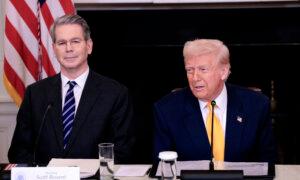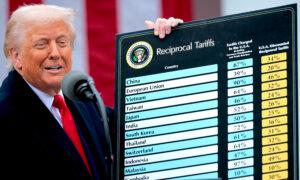Trump said that he will not make a deal with China unless the trade deficit is resolved.
President Donald Trump on Sunday defended his sweeping tariffs on imports from other countries, saying they are aimed at fixing the trade imbalance, not at causing a global stock market selloff.
“I don’t want anything to go down. But sometimes you have to take medicine to fix something,” Trump told reporters aboard Air Force One.
“We have been treated so badly by other countries because we had stupid leadership that allowed this to happen,” he said. “And it’s not sustainable.”
His remarks came as U.S. stock futures dropped on Sunday, with S&P 500 stock futures falling 4 percent, and Dow Jones declining 3.8 percent while Nasdaq futures sank 4.6 percent.
Despite the market volatility, Trump is not backing down from his tariff policies. Trump cited the trade deficit with other countries, particularly China, as the reason for pushing the tariffs.
“What’s going to happen to the markets I can’t tell you. But I can tell you, our country has gotten a lot stronger,” he said. “And eventually … It’ll be the most dominant country economically in the world.”
Trump said that he will not make a deal with China unless the “trillion-dollar” trade deficit is resolved.
“When you look at the trade deficit that we have with certain countries, way over a billion per country, with China is trillion dollars,” he said. “I’m willing to deal with China, but they have to solve their surplus. We have a tremendous deficit problem with China.”
On April 2, Trump announced a minimum 10 percent tariff on all trading partners, as well as higher levies on about 60 nations identified by the administration as “worst offenders” in trade imbalances with the United States—with China near the top of the list.
Specific levies include a 34 percent tariff on Chinese imports—raising total tariffs to 54 percent, 46 percent on Vietnam, 24 percent on Japan, and 20 percent on Europe. The global tariffs took effect at 12:01 a.m. on April 6, with the higher, targeted tariffs scheduled to begin on April 9.
Canada and Mexico were exempt from the latest tariffs because they are already subject to tariffs of 25 percent that were announced several weeks ago. Those tariffs were levied in a bid to curb illegal immigration and fentanyl trafficking into the United States via its southern and northern neighbors.
Many world leaders have moved to initiate negotiations with Trump, including reducing or removing their own tariffs on the United States, while some like China have weighed countermeasures.
Kevin Hassett, head of the White House’s National Economic Council, said on April 6 that more than 50 countries have since reached out to the administration to negotiate the tariffs.
“They’re doing that because they understand that they bear a lot of the tariff,” Hassett said in an interview with ABC News. He did not specify which countries have started talks.
Just two days after the tariff announcement, the Dow Jones Industrial Average dropped a combined 4,000 points on April 4. The Nasdaq plunged by 5.82 percentage points, and the S&P 500 also posted a similar decline, dropping by 5.97 percent on April 4.
Following that decline, Trump shared a post on Truth Social on April 5 urging Americans to “hang tough” through what he described as a difficult but necessary adjustment period, calling it an “economic revolution.”
Department of Treasury Secretary Scott Bessent told NBC News on April 6 that he is not concerned with the stock market’s initial reaction to the tariff announcement because “the market consistently underestimates Donald Trump.”
He also rejected the assumption that Trump’s tariffs will inevitably end in a recession.
Reuters, Tom Ozimek, and Jack Phillips contributed to this report.








